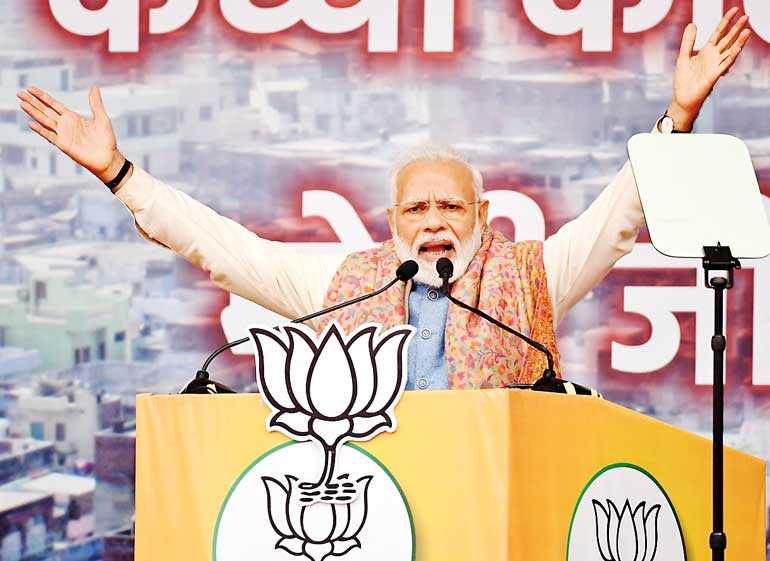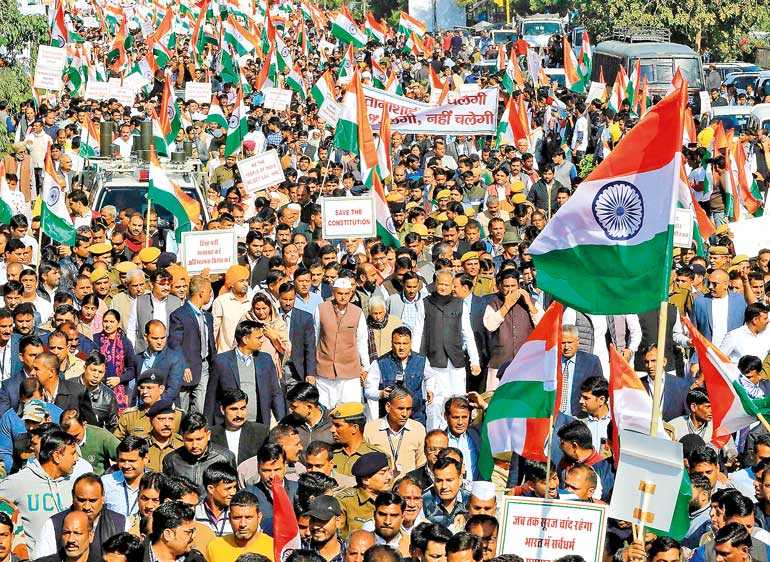Wednesday Feb 18, 2026
Wednesday Feb 18, 2026
Monday, 23 December 2019 00:24 - - {{hitsCtrl.values.hits}}

India’s Prime Minister Narendra Modi speaks during a rally in New Delhi on 22 December Modi fired up delirous party supporters on 22 December as a wave of protests and clashes that has killed at least 25 put the Indian leader and his Hindu nationalist government under pressure like never before – AFP

Rajasthan Chief Minister Ashok Gehlot (center) along with congress party leaders, workers and supporting parties takes part in a march against India’s new citizenship law in Jaipur on 22 December Prime Minister Narendra Modi sought on 22 December to reassure India’s Muslims as a wave of deadly protests against a new citizenship law put his Hindu nationalist government under pressure like never before – AFP
NEW DELHI, AFP: Prime Minister Narendra Modi sought Sunday to reassure India’s Muslims as a wave of deadly protests against a new citizenship law put his Hindu nationalist government under pressure like never before.
At least 25 people have died in 10 days of demonstrations and violence after Modi’s government passed the law criticised as anti-Muslim. More protests took place Sunday.
Addressing party supporters in New Delhi – who cried “Modi! Modi!” at the mention of the law – the 69-year-old said Muslims “don’t need to worry at all” – provided they are genuine Indians.
“Muslims who are sons of the soil and whose ancestors are the children of mother India need not to worry” about the law and his plans to carry out a national register of citizens, Modi told the crowd of thousands.
Accusing the main opposition Congress party of condoning the recent violence by not condemning it, Modi said opponents were “spreading rumours that all Muslims will be sent to detention camps”. “There are no detention centres. All these stories about detention centres are lies, lies and lies,” he said.
The demonstrations have been largely peaceful but protesters have also hurled rocks and torched vehicles, while heavy-handed police tactics including the storming of a Delhi university a week ago have fuelled anger. Tens of thousands of protests gathered late Saturday in the southern city of Hyderabad, while other protests were held elsewhere. Yet more took place or were scheduled on Sunday, including in Delhi and Kolkata.
The law gives religious minority members – Hindus, Sikhs, Jains, Parsis, Christians and Buddhists – from three neighbouring Islamic countries an easier path to citizenship, but not if they are Muslim.
Islamic groups, the opposition and others at home and abroad fear this forms part of Modi’s aim to marginalise India’s 200 million Muslims and remould the country as a Hindu nation, something he denies.
Authorities have imposed emergency laws, blocked internet access – a common tactic in India – and shut down shops in sensitive areas across the country in an attempt to contain the unrest.
More than 7,500 people have either been detained under emergency laws or arrested for rioting, according to state officials, with 5,000 in Uttar Pradesh state alone where 17 people have been killed.
Some 500 people have also been injured in Uttar Pradesh including 263 police, while two people were shot dead in the southern state of Karnataka and six died in Assam in the northeast last week.
In Assam, opponents of the legislation fear it will enable large numbers of Bengali-speaking immigrants, many of whom are Hindu, to settle there.
But elsewhere, opponents say the law has made religion a test for citizenship ahead of a nationwide register that Modi wants to carry out by 2024 to remove all “infiltrators”.
The US State Department this week urged New Delhi to “protect the rights of its religious minorities in keeping with India’s constitution and democratic values”.
Modi’s government, re-elected in May, has defended the law saying it is meant to help “persecuted” minorities from Muslim-majority Pakistan, Bangladesh and Afghanistan.